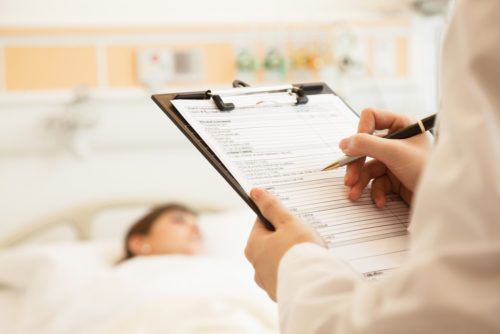Due in part to the COVID-19 pandemic, about 30 million U.S. residents lack health insurance. However, collections agencies, doctors, and hospitals aren’t concerned with whether you choose to have health insurance or have lost it due to circumstance; if you don’t have it, you’ll still have to pay.
Medical expenses quickly become cumbersome regardless of whether you have insurance. Especially with unexpected hospital bills, you’ll have to find a way to pay up if you don’t have health insurance.
There are ways for people who don’t have insurance to reduce the cost of their bill — including finding errors in their bill, finding an affordable clinic, or enrolling in financial assistance. These options should all be exhausted before your medical debt goes to collections and your credit score is damaged.
Table of Contents
4 Ways to Pay for Hospital Bills Without Insurance
You may be ignoring your medical bills or don’t even know where to start if you don’t have insurance to help pay for the expenses. If you find that you are in this predicament, consider the following options to help reduce medical bills — making them manageable so you can pay for them out-of-pocket.
1. Find Affordable, Discount, or Sliding Scale Clinics
As long as you’re not facing an emergency situation, you might have the opportunity to search around for an affordable alternative for care. There are many clinics available that can offer low-income or sliding scale options.
Additionally, shopping around now can potentially help you down the road in case an emergency situation happens. You’ll be able to know what hospitals to visit and which to avoid due to their prices.
The best way to find out the cost of a visit or service is simply to call ahead and ask. Additionally, there are some databases available — such as the National Association of Free and Charitable Clinics — that you can use to discover affordable clinics in your area.
2. Review Your Bills and Dispute Inaccurate Claims
If you already have medical bills from past procedures, you can always review your bills and dispute any inaccurate claims.
Many hospital billing departments will make mistakes; the estimated percentage of inaccuracies varies widely, but it has been reported that four in five medical bills contain errors — resulting in $68 billion annually in unnecessary healthcare spending. Additionally, even doctors or nurses can enter incorrect information on your patient chart.
Since many hospital bills will be in the form of a medical code, finding inaccuracies can be difficult. Luckily, many of the codes used on the bill are universal and can be researched online. Once you understand the codes, you can look for any potential errors, such as:
- Duplicate claims.
- Canceled work.
- Typos.
- Charges for services not received.
- Incorrect room charges.
- Inflated fees for services, your hospital stay, or medication costs.
It never hurts to review your bill, ask questions about specific aspects that might be confusing, and dispute anything that wasn’t accurate. Remember: don’t pay it until you understand it.
3. Negotiate Your Bill and Get on a Payment Plan
Many hospital bills have a portion of fine print at the bottom of the invoice that discusses possible payment plans. Many of these plans are also interest-free. If you find yourself facing a massive medical bill that you can’t pay off in one go, then it could be worth it to explore these payment options.
Every hospital will have a different option, but it’s important to know that figuring out a repayment plan with the hospital is not a guarantee that the bill won’t go to collections. There’s still a possibility that your bill could be turned over if you pay just a couple days late or you don’t pay the minimum amount requested. And hospitals don’t have to warn you when your payment goes to collections.
If you do manage to negotiate a repayment plan, make sure you’re aware of all the requirements before you sign up. If your bill does go to collections, you’ll just have to renegotiate another payment plan, and collection agencies don’t have ideal options.
4. Apply for Financial Assistance
In the end, some hospital bills are simply too large to overcome. If you fall into this camp, don’t be discouraged. Medical debt is one of the most common forms of household debt in the United States, so you’re certainly not alone. Also, you’re not out of options yet.
Outside of payment plans, hospitals might also offer financial assistance for astronomical bills. If this is the case, they may first require you to apply for Medicaid assistance.
If you are rejected from Medicaid, they might ask to see your tax returns, paychecks, or other financial information to ensure you qualify. If approved, they could offer you a discount on your bill, or have some other options available.
No matter what, asking for financial assistance will require a lot of paperwork, but could also be your best way to avoid massive debt and potentially going into collections.
What Can Help With Medical Bills?
There are several options for financial assistance to help with medical expenses. The more recent method of crowdfunding for medical expenses has become popular, but there are nonprofits that are willing to help you find government programs and tax deductions.
- Assistant programs and grants: Whether through the hospital or other organizations, medical debt assistance options are available, such as:
- Samaritan Health Services;
- HealthWell Foundation;
- The PAN Foundation;
- These are a few organizations to look at when starting your search for assistance with hospital bills. However, remember that you must qualify first — which will likely involve income-based proof that you need relief. Pay stubs or tax returns may be required.
- Medicaid: If you qualify for Medicaid, there is a possibility that your hospital expenses may be paid for in part or whole. Additionally, Medicaid funds typically cover the cost of future treatments and medications.
- Tax returns: The IRS allows you to deduct qualified medical expenses on your taxes. Make sure the expenses you are looking to deduct are deductible before relying on this assistance. Dental expenses, vision and hearing aids, and other medical devices can be deducted also.
What Happens if You Can’t Pay Your Medical Bills?
The consequences of not paying your medical bills have the possibility of leading to jail time. While you can’t directly go to jail for not paying your medical bills, you can be sued by the medical provider or collections agency. Failure to show up in court for this lawsuit can result in jail time.
Other, less extreme measures can see your bill being sold off to collections and hurting your credit score. You may end up being sued for unpaid medical bills, but if the debt is unmanageable you may have to file for medical bankruptcy.
Drastic collection measures will be relentless until you pay your bill or file for bankruptcy. It is never a good idea to ignore your hospital bills, which is why it will be imperative that you dispute inaccuracies, negotiate for a smaller bill or payment plan, find affordable clinics, and enroll for financial assistance so this debt can be kept under control.
Image Source: https://depositphotos.com/





